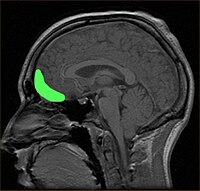
Photo from wikipedia
Background Impulsivity has been defined as a tendency to respond with little forethought, often with disregard to the negative consequences to the impulsive individual or others. Problem gambling patients are… Click to show full abstract
Background Impulsivity has been defined as a tendency to respond with little forethought, often with disregard to the negative consequences to the impulsive individual or others. Problem gambling patients are characterized with impulse control and absent inhibition control, a tendency to react to stimuli in a rapid and unplanned fashion without complete processing of information. Method Based on the information processing theory and the dual-systems model of self-control, 208 moderate-risk gambling were investigated by questionnaire to explore the moderating effect of self-control in the process of cognitive bias and cognitive style affecting the gambling impulse of moderate-risk gambling. Conclusion Using hierarchical regression analysis, it is found that: (a) The gambling impulse of male moderate-risk gambling was stronger than female moderate-risk gambling. (b) Self-control negatively predicted trait impulsivity, and the stronger the individual self-control, the lower the level of trait impulsivity. (c) Cognitive bias positively predicted trait impulsivity, and high cognitive bias induced high-level trait impulsivity. Self-control played a moderating role between cognitive bias and trait impulsivity. (d) Compared with field-independent gambling, field-dependent gambling were more likely to have impulsive thoughts of gambling activities. Self-control played a moderating role between cognitive style and trait impulsivity.
Journal Title: Frontiers in Psychology
Year Published: 2023
Link to full text (if available)
Share on Social Media: Sign Up to like & get
recommendations!